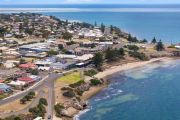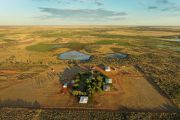
Hoteliers see housing crisis as ally in war against Airbnb, Stayz
The country’s biggest hoteliers say Airbnb and other short-term rental accommodation providers such as Stayz should be forced to pay big fees and properties allowed to be leased for only three months a year.
In a submission to the federal government’s budget preparation process, Accommodation Australia said investors were buying properties and using them entirely for holiday rentals, worsening housing affordability problems and making it difficult for its own workers and others.
Accommodation Australia represents some of the biggest global operators including Marriott International, Hilton and InterContinental Hotels, along with thousands of smaller-hotel owners around the country.

It has long campaigned against Nasdaq-listed Airbnb, which allows property owners to rent out real estate for short periods. But leasing properties through the platform has increasingly become professionalised, with dedicated agents now overseeing portfolios of homes.
“Our concern is the unregulated and increasing rise in people buying properties as investments to list as a short-term rental has worsened the housing affordability and housing accessibility crisis,” Accommodation Australia chief executive James Goodwin said.
In its submission, Accommodation Australia has advocated for national rules that would make it difficult for property owners to lease houses for more than three months. The organisation wants a national registration scheme, and for those leased for more than 90 days to be forced to apply for commercial accommodation licences like hotels and motels must do.
At the centre of the tussle between hoteliers and Airbnb property owners is Byron Bay, where the local council has introduced a 60-day cap.
Michael Skinner owns Elements of Byron, a luxury beachfront hotel in the area. He said that the federal government needed to introduce a national scheme, and not rely on local councils to implement their own.
“We do find that people coming into town that are planning to move here, will then say it’s just too hard to find somewhere affordable to live,” Skinner said. “Experienced people that want to live in the region and work are also deciding to go elsewhere due to lack of housing that is affordable.”
On the other side of the argument is Sharmila Campbell, who runs a baby equipment hire business. Most of her clients stayed at Airbnbs and Stayz, and Campbell said they were not to blame for housing shortages.
“Most Byron Bay property owners are adamant that they won’t be returning the property to the permanent market. It’s their holiday home so what they are now doing is renting over the peak periods and then the rest of the year the homes sit empty,” she said. “Due to the shorter periods of them renting out those homes, we’ve reduced our full-time staff from five to three.”
‘Bizarre suggestion’
Airbnb described the hoteliers’ suggestions as “bizarre”, and its public policy head, Michael Crosby, accused Accommodation Australia of trying to “limit competition in the accommodation space in a purely self-serving way.
“It’s completely unclear what this would mean for those states and territories who have already introduced regulations for the sector. Airbnb has long advocated for evidence-based regulation of the short-term rental sector, which balances tourism benefits with protecting housing,” he said.
Crosby said lack of new homes was to blame for the housing shortage rather than empty short-term rentals, citing that these homes accounted for just 1 to 2 per cent of overall housing stock nationally.
Stayz director of corporate affairs Eacham Curry took a similar view, saying that regulation of short-term rental accommodation was a state issue rather than a federal one.
“The federal government does not have the necessary legislative tools to create regimes which include registers and codes of conduct,” he said.











